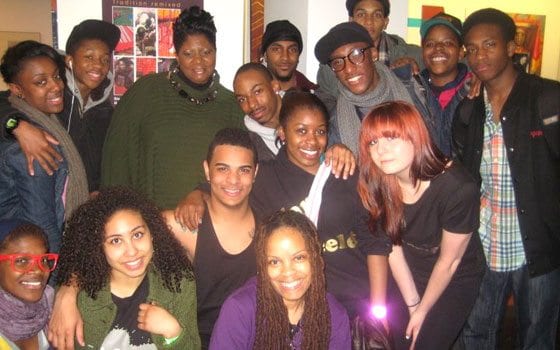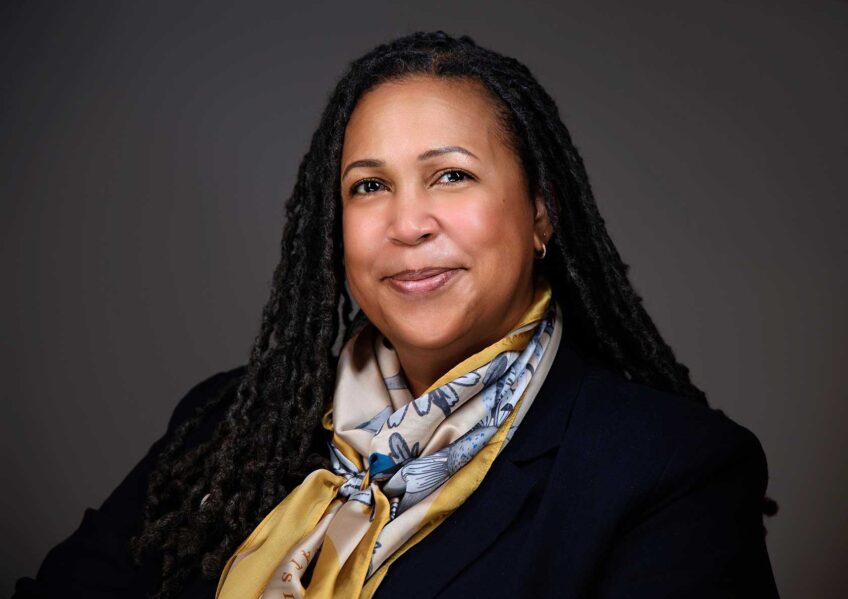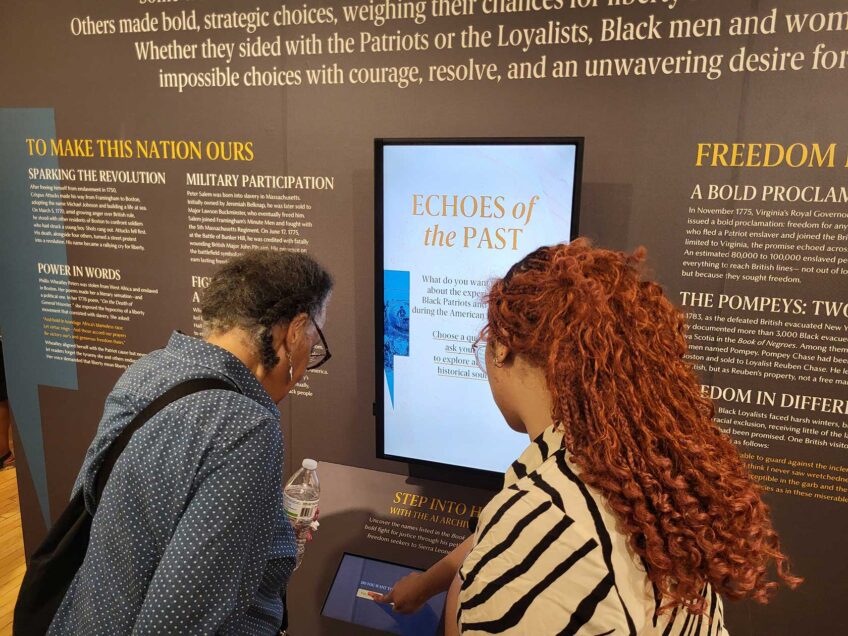
| Cindy “Mother Hip Hop” Diggs plays the role of Ebony Scrooge in “Hip Hop 9.1.1.” (Aram O. photo) |
On the eve of Easter Sunday, Cindy Diggs, known to many around Boston as “Mother Hip Hop,” stood at the center of the stage in Roxbury Community College’s Media Arts Center and declared that day to be the beginning of the resurrection of Boston’s urban community.
She had just finished playing Ebony Scrooge, the lead character in “Hip Hop 9.1.1.,” a theatrical production that took the audience “back to the future” of Boston hip hop in hopes of educating and empowering people of all ages to use hip hop music and culture to unite and uplift the community. Paying homage to an art form that constantly rebirths the old into something new, the cast of nearly 80 rolled the figurative stone away, using music, dance and drama to shed light on hip hop’s vital role in creating and restoring peace.
Based on the Dickens’ classic “A Christmas Carol,” the play opens with Ebony voicing frustration with the lack of support for her efforts to bring peace back to a city ravaged by violence. On the eve of what she promises will be her last community empowerment event, she falls asleep but is awakened throughout the night by visits from the Ghosts of Hip Hop Past, Present and Future, who take turns showing her how hip hop has and can continue to play a vital role in the community.
The Ghost of Hip Hop Past (Dilania Tirado) takes her back in time to the 1980s and early 1990s, when hip hop was still in its infancy and Ebony was working tirelessly to teach local hip hop artists the ins and outs of the industry. The Ghost reminds Ebony of all the events, including a music conference panel featuring music industry maven Wendy Day (Darcie-Nicole Wicknick) and Epic Records marketing and promotions director Cliff “C1” Braithwaite (playing himself), she hosted to help educate artists on how to get their music heard and CDs sold.
Local hip hop artist and street worker/mentor Will Harvey’s performance as The Ghost of Hip Hop Present had the audience doubling over with laughter as he delivered witty lines about milking hip hop — now a global cash cow — for all it’s worth. Dressed in gaudy dollar-sign sunglasses and a matching gold chain, his message starts out silly, but gets serious when he gives Ebony a glimpse of how this “get money” mentality has devitalized today’s youth, creating a state of emergency (and hence, the play’s title). In a particularly powerful scene, young girls clad in prison jumpsuits perform a dynamic dance routine set to Michael Jackson’s “They Don’t Care About Us,” illustrating how institutionalized oppression, drugs and lack of education have put youth in mental, physical and emotional prisons.
The Ghost of Hip Hop Future, played by phenomenal young dancer Shaquan Reed, shows Ebony that the next generation has the skills, creativity and passion needed to restore peace in the streets. He presents her with riveting performances by youth dance crews The Boston Tap Company, Thee Slap Bracelets, the Hard Rock krumpers, the Say No Rocket jerkers/dougies and solo routines by Reed himself, whose captivating command of the stage, fluid movement and mastery of several different dance styles easily won the crowd over.
A melange of music and dance, the play also featured performances by RandB singer Lisa Bello as the late Teena Marie, a father/son DJ duo trying to show each other up on the wheels of steel, Sigma Gamma Rho sorors doing a spirited step routine and breakdancing b-boys The Floorlords windmilling, head spinning and flipping across the stage. The audience of almost 200 applauded and cheered the actors and performers on at nearly every turn.
Diggs, who’s been part of the local hip hop scene for as long as it’s existed, could certainly relate to the character she played. Like Ebony, Diggs has been “one of the few adults that have been out there struggling with these young people, trying to give them the jewels that they need and trying to teach them how the music industry works,” says Vivian Smith-Barnes, the show’s playwright and Diggs’ close friend. “[Ebony’s] become a little bit sour because she doesn’t get the support and response [she needs] from her peers, which are the adults.”
Despite decades of work using arts and activism to inspire youth, Diggs, who spearheads Peace Boston and works closely with the Louis D. Brown Peace Institute, has watched the peace in Boston’s urban community die a slow death, taking with it countless young people whose talents will never be fully expressed or experienced. Convinced there’s little they can do, many people support from the sidelines rather than the front lines — that is if they support at all.
A seasoned youth worker and Boston hip hop vet herself, Smith-Barnes was inspired to turn Diggs’ struggles and successes into a story that highlighted the history of hip hop in Boston, addressed the obstacles youth often face and demonstrated how adults can use hip hop to put youth on more positive and promising paths. “With Hip Hop 9.1.1., we wanted to address the generation gap,” says Smith-Barnes. “There’s a huge gap between young people and older people, and it’s something we see in every generation.”
The idea that hip hop is something that parents just don’t understand and that youth just can’t live without was apparent throughout the play. In a scene from the first act, the Ghost of Hip Hop Past takes Ebony back to an argument she had with her mother. Young Ebony wants to attend a hip hop show, but her mother, who just can’t see what all the fuss is about, won’t let her.
In a later scene, the Ghost of Hip Hop Future shows Ebony a workshop where children and their parents are discussing hip hop. When the facilitator plays a Lil Wayne song that samples soulstress Nina Simone, both young and old realize that they have more in common than they think.
Throughout the show’s three acts, a single thread was apparent: education opens lines of communication, and communication creates the understanding necessary to establish and maintain peace.
And it’s the idea of peace and unity that truly embodies what hip hop is about.
Says Wicknick, “I would love to see the message of peace that’s carried out throughout this production really be awakened. Hopefully, we won’t have a violent summer like we did last year.”







